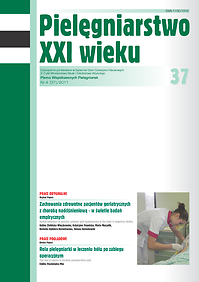Transplantation of human organs in the light of the Catholic Church teaching
Keywords:
Catholic Church, organs transplantAbstract
The most important requirements, which the Church makes the transplantation dependent on after death (ex mortuo), is the death of the donor and his/her consent expressed earlier. As far as the fulfillment of the first ethical determinant of the transplantation of the dead bodies is regarded, the theologians share the medical definition of man’s death and they indicate the brain death as its obvious sign.
Brain death was considered to be not only definite but also sufficient criterion for the person to call them dead. This criterion allows achieving the degree of ethical judgement, which is referred to as a moral certainty. Such certainty is considered necessary and sufficient basis for an ethically correct action.
The category of the gift is inextricably linked to the second ethical condition of the transplantation of organs after death, namely – the consent of the donor. Christian ethicists put stress on the need of granting conscious consent, because only then the transplant can be perceived as a gift, the sacrifice made of oneself. The direct permission of the donor cannot be substituted by the decision of the state, family or society. All institutions except the donor are only mediators of this gift, which he/she offered. All attempts to omit this rule through the legislation allowing the use of the so-called implied consent ruin the personal dimension of organ donating.
Also the recipient cannot forget about this unique act of love, thanks to which he/she can enjoy life and health. Somebody’s act of love should trigger the gratitude, love and generosity in him. A very important issue for the recipient is also the respect of his personal dignity. This means preventing situations in which the donor is treated as an object of testing or medical experiments.
This full recognition and acceptance of the truth of The Catholic Church for transplantation ex mortuo (after death) apart from the mentioned conditions refers to respect of the human body during those treatments, which is always a body of an individual. It cannot be treated solely in physical or biological terms.
The key points of the ethicists’ opinion towards transplant also underline the unselfishness of the gift, considering trading in organs and tissues derived from own or other people’s bodies as absolutely immoral. This can generate various forms of illegal collection and distribution of organs. Through the trade in organs transplant medicine would be involved in the cruel destruction of the health of the poor to save the rich.
And this indeed constitutes a great danger. That is why in this very delicate matter a lot of consideration and concrete law is needed.
Differentiation of ethical ratings of transplantation was reflected not only in the possibility of financial frauds accompanying transplants, but also in the ambiguity of situations, in which somebody’s death is awaited in order to get organs necessary for transplant.
Plea of selfish anticipation of the death of the organ donor can function as long as the issue of transplants is not taken in the context of either Christian principle of charity or its human equivalents. It is important to develop such organizational and technical procedures of getting organs as not to disturb the respect towards the dying human being and the feelings of the family.
Ethics prohibits donating all organs. This applies to transplantation of the gonads and brain, with which in some way the personality and individuality of a human being is connected. Prohibition concerning the brain results from the responsibility of protecting the donor and his good. Sampling the brain tissue would constitute crossing the border of acceptability of risk and harm for the donor.
References
1. Sikora A. Transplantacja narządów w świetle nauki Kościoła i wypowiedzi Jana Pawła II. Kardiochirurgia Torakochirurgia Polska. 2004;4, tom I:119-20.
2. Katechizm Kościoła Katolickiego. Poznań: Pallotinum;1994, s.2295-96.
3. Wójcik B. Etyczne aspekty transplantacji serca. Kardiochirurgia Torakochirurgia Polska 2004;4, tom I: 134-36.
4. Biesaga T. Trudny dar ratujący życie. Medycyna Praktyczna. 2009;1:142-44.
5. Biesaga T. Wobec zgody domniemanej i zawłaszczania zwłok do transplantacji. Medycyna Praktyczna. 2006;1:20-4.
6. Nowacka M. Etyczne i filozoficzne konsekwencje terapii transplantacyjnej. Postępy Rehabilitacji. 2000;4:97-05.
7. Jan Paweł II. Evangelium Vita. Encykliki Ojca Świętego bł. Jan Pawła II, Kraków: Wydawnictwo Rafael; 2011, s. 86, 620, 566.
8. Jan Paweł II. Podarować cząstkę siebie. Fragmenty przemówienia wygłoszonego do uczestników Kongresu Transplantologicznego. Watykan 20 czerwca 1996 roku. W drodze. 1997;1:67.
9. List Pasterski Episkopatu Polski. Jasna Góra, 25 sierpnia 2007 r.
10. Jan Paweł II. Przemówienie do uczestników Światowego Kongresu Towarzystwa Transplantologicznego. Rzym 2000.
Downloads
Published
Issue
Section
License
Copyright (c) 2011 Ks. Stanisław Gulak (Autor)

This work is licensed under a Creative Commons Attribution 4.0 International License.




